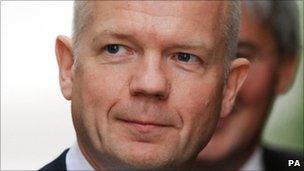Human rights to be at heart of diplomacy, insists Hague
- Published

Mr Hague said the UK's security would be affected if human rights abuses go unchecked
William Hague has called for more emphasis within foreign policy on protecting human rights, saying the UK must always "have a conscience".
The government will "strengthen" its focus in the area, the foreign secretary said in a speech in London, arguing it is inextricably linked to the UK's security and standing.
A new group, including aid experts, will advise ministers on the issue.
But Labour said the government had cut funding for human rights programmes.
It said the Foreign Office had been set to downgrade a report which has analysed countries' human rights records around the world since 1997, but bowed to pressure after criticism of the move.
'Matter of principle'
Shortly after taking office in May, Mr Hague promised that a judicial inquiry into claims British intelligence officers were complicit in the torture of terror suspects overseas would begin once the police have completed their own investigation.
Mr Hague alluded to this in his speech - the last in a series of three about the UK's foreign policy goals - saying the country's reputation was "directly linked to the belief of others that we will do what we say and we will not apply double standards".
He pledged to "learn the lessons" of incidents that have affected the UK's "moral standing" and stressed the government would speak out as a "matter of principle" over human rights abuses.
Since becoming foreign secretary, Mr Hague has said the UK's security and prosperity would drive its diplomatic efforts, but has insisted this would not come at the expense of neglecting human rights.
'Upholding values'
"There will be no downgrading of human rights under this government and no resiling from our commitments to aid and development," he said.
"Indeed I intend to improve and strengthen our human rights work. It is not in our character as a nation to have a foreign policy without a conscience, and neither is it in our interests."
The Foreign Office is to publish guidelines to its staff on the need to report any cases of torture or cruel, inhuman and degrading treatment that they come across in the course of their work.
"We cannot achieve long-term security and prosperity unless we uphold our values," Mr Hague added.
"Where human rights abuses go unchecked our security suffers. And our international influence will bleed away unless we maintain our international standing and cultural influence."
However, Mr Hague said idealism in foreign policy must always be "tempered by realism", pointing out that the UK would promote trade with countries which do not necessarily share its values.
Shadow foreign secretary David Miliband said Mr Hague's words were not matched by his actions.
"William Hague has cut programmes on human rights and democracy by £560,000 this financial year, while the government has watered down Labour's policy for a universal standard for arms sales."
Amnesty International said Mr Hague "talked a good game" on human rights, but stressed that it would judge the government on its actions and ministers must not "keep quiet" about abuses when they could damage trade or upset key allies.
- Published15 September 2010
- Published8 September 2010
- Published14 July 2010